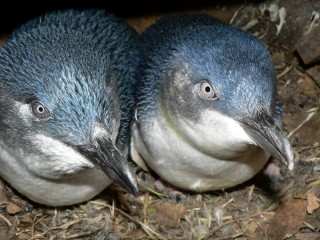Penguins Use Their Personalities to Prepare for Climate Change

John F. Cockrem, PhD Little penguins’ personalities may help them cope with climate change
According to the Audubon Society, nearly half of all North American bird species are severely threatened by shifts in climate. The threat reaches beyond North America and could have similar effects on global bird populations.
John Cockrem of the Institute of Veterinary, Animal and Biomedial Sciences at Massey University in New Zealand suggests that a bird’s individual personality may be among the factors that could improve its chances of successfully coping with environmental stressors.
He studied differences in the level of the stress hormone corticosterone that native little penguins (Eudyptula minor) secreted when exposed to stressful stimulus.
“There is considerable individual variation in corticosterone responses, and a stimulus that initiates a large response in one bird may initiate a small response in another bird,” Cockrem wrote. “Corticosterone responses and behavioural responses to environmental stimuli are together determined by individual characteristics called personality.
Birds with low corticosterone responses and proactive personalities are likely to be more successful (have greater fitness) in constant or predictable conditions, whilst birds with reactive personalities and high corticosterone responses will be more successful in changing or unpredictable conditions.”
These findings may help in predicting the adaptability of bird species as they face a new normal. Cockrem will present the talk “Corticosterone responses and the ability of birds to cope with environmental change” at the American Physiological Society (APS) intersociety meeting “Comparative Approaches to Grand Challenges in Physiology” on October 8, 2014.
APS jointly hosts this intersociety meeting with the Society for Experimental Biology, Society for Integrative and Comparative Biology, Australian and New Zealand Society for Comparative Physiology and Biochemistry, Canadian Society of Zoologists, Crustacean Society and International Society for Neuroethology. View the full program: http://ow.ly/Cgd3d.
NOTE TO JOURNALISTS: To receive a full list of abstracts to be presented at the meeting or to arrange interviews with comparative researchers, please contact Stacy Brooks in the APS Office of Communications (301-634-7209; sbrooks@the-aps.org).
Physiology is the study of how molecules, cells, tissues and organs function in health and disease. Established in 1887, the American Physiological Society (APS) was the first U.S. society in the biomedical sciences field. The Society represents more than 11,000 members and publishes 14 peer-reviewed journals with a worldwide readership.
Contact Information
Stacy Brooks
Communications Manager
sbrooks@the-aps.org
Phone: 301-634-7209
Media Contact
All latest news from the category: Ecology, The Environment and Conservation
This complex theme deals primarily with interactions between organisms and the environmental factors that impact them, but to a greater extent between individual inanimate environmental factors.
innovations-report offers informative reports and articles on topics such as climate protection, landscape conservation, ecological systems, wildlife and nature parks and ecosystem efficiency and balance.
Newest articles

Nerve cells of blind mice retain their visual function
Nerve cells in the retina were analysed at TU Wien (Vienna) using microelectrodes. They show astonishingly stable behavior – good news for retina implants. The retina is often referred to…

State-wide center for quantum science
Karlsruhe Institute of Technology joins IQST as a new partner. The mission of IQST is to further our understanding of nature and develop innovative technologies based on quantum science by…

Newly designed nanomaterial
…shows promise as antimicrobial agent. Rice scientists develop nanocrystals that kill bacteria under visible light. Newly developed halide perovskite nanocrystals (HPNCs) show potential as antimicrobial agents that are stable, effective…



